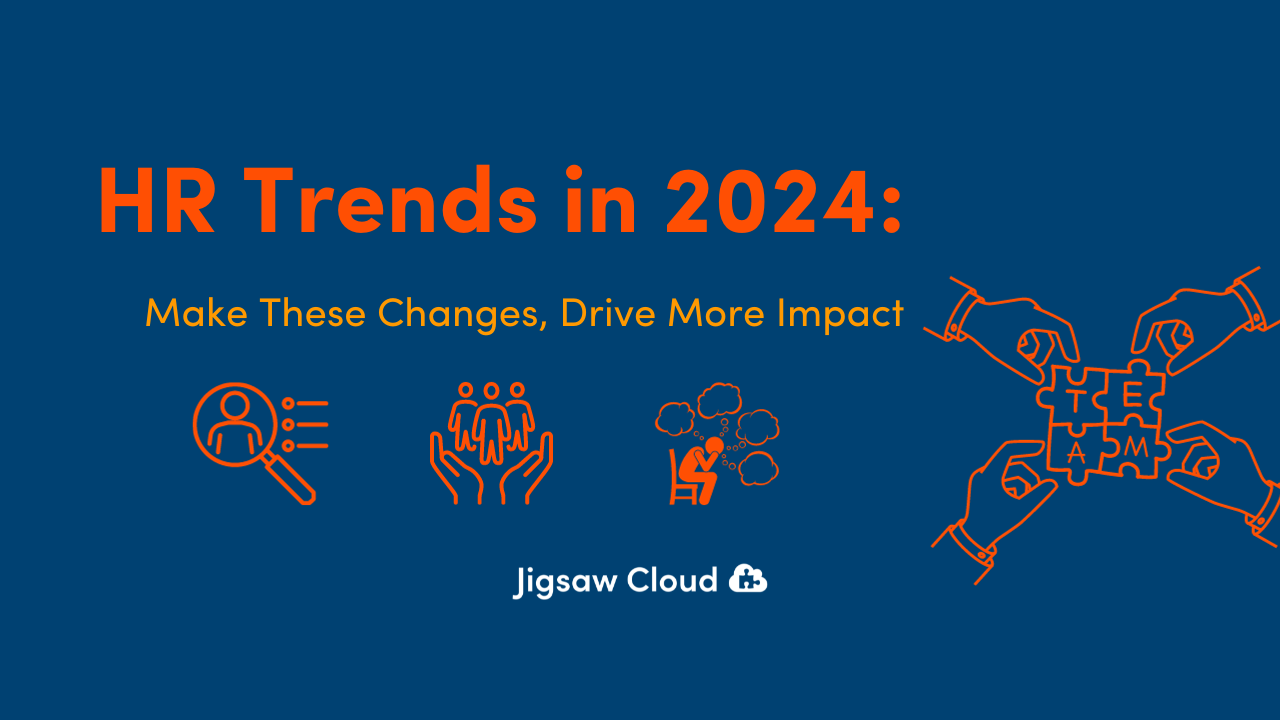
The Gartner HR Priorities 2022 report is out. Jigsaw Cloud has analysed the results with thoughts and expert advice for HR leaders from our founder and managing director in our latest blog.
HR leaders have had some big responsibilities over the past two years. They’ve helped organisations manage wide-scale disruption, adapt to new ways of working, and navigate new employee management challenges.
Going into 2022, their roles are just as crucial. They need to cement temporary changes into long-term strategies that’ll give their organisations and employees the guidance they need over the next few years.
Recently, Gartner surveyed more than 500 HR leaders across a broad range of industries to assess their priorities and expected challenges for 2022 – covering everything from the predicted skills gap and the future of leadership, to organisational design and change management.
To put the results into context, we asked Jigsaw Cloud Founder Paul Rae and Managing Director Liz Williams to offer their expert takes on the findings and share advice for HR leaders currently planning their strategies for the coming year.
Gartner result: Building critical skills and competencies is the top priority for HR leaders in 2022, with 59% making it a priority next year
Gartner Report 2022
Liz Williams:
“I’m not surprised to see such a strong focus on building critical skills and competencies. The pandemic made many organisations realise their resilience isn’t at the level it needs to be – and a big part of that is down to the lack of certain skills across teams.
Now, many employers and HR leaders are planning to build resilience by transforming core parts of their business, such as leadership, development, and ways of working. Strong skillsets are the foundation of any successful transformation, so it’ll be critical that HR leaders know what they have in house, what they’ll need to develop, and what they’ll need to outsource.”
Gartner result: 48% of HR leaders are concerned about their employee turnoverA chance to rethink what modern learning looks like
Gartner Report 2022
Paul Rae:
“Unfortunately, we did see an incredible level of churn across organisations during the pandemic. Peoples’ living situations changed, many rethought their careers, and some were let go or never returned from furlough.
The churn really proved that trust and loyalty are still incredibly important between employees and employers. Employees want to feel their employers are invested in their development and personal wellbeing. Also, employers need to trust their employees, and create working environments that make team members feel welcome and valued.
These concepts will be critical as employers and HR leaders face the challenge of replacing lost skills in their organisations. If not managed effectively, some employers may find themselves losing other valuable members of their teams.”
Gartner result: 92% of HR leaders expect to see at least some of their employees working remotely
Gartner Report 2022
Paul Rae:
“There’s no doubt that remote working is here to stay. For many employees, it offered greater flexibility that they won’t want to give up anytime soon. But, it does create challenges for HR leaders and employers who now need to manage a permanent hybrid workforce.
To help maintain a sense of team cohesion and keep remote employees on track, HR leaders will need to encourage managers to move away from task-based management to output-based management. Or, to put it another way, focus on the bigger picture of their teams’ outputs, rather than just individual tasks.
This will help organisations ensure their employees don’t feel isolated from their colleagues, and help retain the sense that they’re working towards shared goals.”
Liz Williams:
“I think HR leaders will also need to identify where their responsibilities are in terms of wellbeing. During the pandemic, the line blurred between home and work for many employees. We also all got to know each other a little better, seeing the background of each other’s homes during Zoom meetings and hosting regular social catch-ups.
Now, HR leaders will need to clearly communicate the support available for remote employees and the professional standards expected from them going forward. It’ll also be important to keep remote employees in the loop just as much as those in the office – this is where a robust employee management system can really help.”
Gartner result: Just four technical requirements and three years of experience eliminates 98% of today’s candidate pool
Gartner Report 2022
Liz Williams:
“Following the pandemic, we’re now left with a candidate market that doesn’t have the skills organisations need to complete their large-scale transformation programmes – and that’s a challenge that’s faced worldwide.
I think this result is partly due to shifting employee behaviours. A recent LinkedIn survey revealed that younger workers are less likely to remain in their roles for long periods – 43% said they’d leave within two years, and only 28% said they plan to stay longer than five years.
Job hopping can be triggered by a wide range of factors too, such as financial gain, career progression, relocation, and general wellbeing. HR leaders will need to consider all these factors if they’re to retain and upskill their top performers to solve their skill shortages. And critically, it’ll involve creating the right modern learning strategy that nurtures talent effectively.”
Gartner result: 54% of HR leaders say their employees are fatigued from all the change
Gartner Report 2022
Liz Williams:
“This is one of the most important results for HR leaders to consider. Employees have been through a lot of disruption and change over the past two years, and organisations haven’t always been best-equipped to support them.
Change management strategies will need to be a key focus for HR leaders in 2022, helping employees to adjust to working patterns and structures that’ll be in place for years to come. Gartner’s three pillars – day-to-day change, trust, and team cohesion – offer a good framework for HR leaders base their strategies on, but crucially, it’s also important to communicate with employees to identify the support they’ll need.
I’d recommend looking back to the advice we shared on the return to work after the pandemic, because a lot of the suggestions remain just as important for designing change management strategies for the year ahead.”
Need helping planning for 2022?
We’ve only covered a fraction of what HR leaders will face in 2022 – there’s much more to consider across the future of work, employee management, skills development, and diversity and inclusion.
If you’d like to discuss your priorities and strategy for the year ahead, we have consultants with decades of HR experience across a wide range of sectors. Just get in touch to see how we can help.


